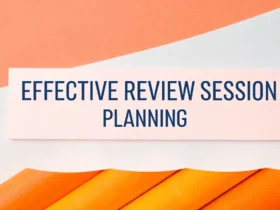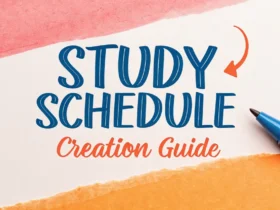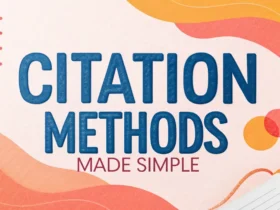Feeling scattered? Brain fog clouding your thoughts? You’re not alone. Many students face focus struggles, especially with today’s constant distractions. But don’t worry, improving your concentration is within reach. It’s not about superhuman willpower, but about using the right tools and techniques.
You can sharpen your focus and achieve your study goals. This article will give you practical concentration tips to help you get the most out of your study sessions.
Concentration Tips: Train Your Brain to Focus
Concentration is the mind’s power to focus on one thing. It is hard to get things done when your mind runs here and there. Is your phone, other things, or the environment where you are studying distracting you? It is time to train your brain to focus.
Why Is Focus a Struggle for Students?
Many things take a student’s focus away from the task at hand. Knowing the cause is the first step to solve the problem. Here are common reasons:
-
Digital Distractions: Devices are for schoolwork, but a lot of times they cause a lack of focus. Social media, games, and notifications pull us in. A study in the Journal of Educational Psychology showed students who used social media during study had lower grades.
-
Stress and Worry: School is hard. When things get tough, it can be tough to stay focused. Stress and worry use up mental power needed for learning. The Anxiety and Depression Association of America says anxiety problems can really hurt a student’s school work.
-
Lack of Sleep: Enough sleep is key. When you don’t sleep enough, your brain can’t work right. You can’t think or remember well. A Sleep Foundation study showed that not sleeping enough hurt test results in students.
-
Poor Study Environment: Where you study matters. Loud noise or a messy place can hurt your focus. Studies show a quiet, tidy place helps people think better.
-
Not Interested: When you don’t care about what you’re learning, it is hard to focus. If work seems boring, your mind may walk away.
Setting Up Your Study Space for Better Focus
The place where you study matters a lot. Make sure your space is neat and calm. Here’s how to set up your study space so you can focus better.
Find a Quiet Spot
Loud noises and lots of movement can take your focus away. Look for a quiet place where you won’t be disturbed. It might be a spot in your house, the library, or a quiet corner in a coffee shop. If you have to study where it’s noisy, try noise-canceling headphones or earplugs.
Keep It Neat
A messy place can mess with your mind. A neat and tidy place helps you think more clear. Clear away books, papers, and other things you don’t need. Have only the things you need for studying.
Good Light Helps
Good lighting can make a big change in how you feel and focus. Use natural light when you can. If you don’t have enough sunlight, use a lamp with a soft light that doesn’t hurt your eyes.
Comfy Chair
If you sit for a long time, you need a good chair. Look for a chair that supports your back and lets you sit up straight. Don’t study in bed or on a couch. These places are too comfy and make you sleepy.
Get Rid of Distractions
The big one: your phone. Turn off your phone or put it away when studying. Turn off social media and other websites that take your focus away.
Make It Yours
Make your study space a place you like to be. Put up things that make you happy and relaxed, like plants, photos, or art. Make sure it is a place where you want to spend time.
Time Management Methods That Boost Concentration
How you manage your time matters just as much as where you study. Time management is a great aid when you want focus. Here’s how to use time tricks to boost your focus.
Pomodoro Technique
The Pomodoro Technique is a simple but strong way to manage time. Work for 25 minutes, then take a 5-minute break. After four “pomodoros,” take a longer break, maybe 20-30 minutes. The Pomodoro Technique book shows how these short bursts of work help you focus.
Time Blocking
Time blocking means planning your day ahead. Break your day into blocks of time. Set each block for a certain task. For example, 9:00-11:00 am for reading, 11:00 am-12:00 pm for writing. The book Deep Work talks about time blocking to get important work done without distractions.
Prioritize Tasks
Know what’s most important. Make a list of your tasks and put them in order by importance. Work on the most important things first. This way, you use your best focus on what matters most. The 7 Habits of Highly Effective People has great advice on how to put things in order and manage your time.
Set Clear Goals
Know what you want to get done in each study session. Set clear and real goals. Instead of saying “study math,” say “do 30 math problems.” Clear goals help you stay on track and feel good when you finish them.
Regular Breaks
Breaks are key for focus. Get up and move around every hour. Stretch, walk, or do something else that gets you away from your desk. Research shows breaks help your brain reset and keep you alert.
Mindfulness Exercises To Center Your Focus
Mindfulness can really help center your focus. It’s about being in the now. Mindfulness methods can train your brain to stay on task and think more clear.
Deep Breathing
When you feel your mind start to go, take a moment to breathe deep. Breathe in slowly through your nose, hold for a few seconds, then breathe out slowly through your mouth. Do this a few times. Deep breathing calms your mind and helps you focus. The Journal of Alternative and Complementary Medicine has research on how deep breathing lowers stress.
Meditation
Meditation is a great way to train your mind to focus. Find a quiet place, sit comfy, and focus on your breath or a word. When your mind walks away, gently bring it back. Even a few minutes of meditation each day can make a big change in your focus. The book Mindfulness for Beginners is a good place to start.
Body Scan
The body scan is about being aware of your body. Lie down and bring your focus to each part of your body, from your toes to your head. Note any feelings without judging them. This exercise helps you connect with your body and mind, and lowers stress.
Focused Attention
Focused attention is about picking one thing and focusing on it fully. It might be a sound, your breath, or how your body feels. When your mind walks away, bring it back to that one thing. This exercise trains your mind to stay focused.
Walking Meditation
Walking meditation is a great way to be mindful when you move. Pay attention to each step, how your feet feel on the ground, and the air around you. This turns a simple walk into a chance to focus and calm your mind.
Diet and Hydration For Peak Concentration
What you eat and drink has a big effect on how well you focus. A good diet and enough water can help your brain work better and keep you alert. Here’s how to use food and water to reach peak concentration.
Eat Brain Food
Some foods are extra good for your brain. Eat foods like fish (salmon, tuna), nuts, seeds, blueberries, and avocados. These foods have nutrients that help your brain think and remember. The book Brain Food has great recipes for a brain-healthy diet.
Healthy Breakfast
Never skip breakfast. It’s the most important meal for a reason. A good breakfast gives your brain the fuel it needs to start the day. Eat things like oatmeal, eggs, or yogurt with fruit. These give you lasting power instead of a quick sugar rush.
Avoid Sugar and Processed Foods
Sugary and processed foods can hurt your focus. They might give you a quick boost, but then you crash and feel tired and distracted. Try to stay away from sodas, candy, and fast food.
Regular Meals and Snacks
Keep your blood sugar steady by eating regular meals and snacks. This stops your energy and focus from going up and down. Good snacks include nuts, fruits, or yogurt.
Stay Hydrated
Water is key for a healthy brain. Not drinking enough water can make you feel tired and foggy. Keep a water bottle with you when you study. Take sips all day to stay hydrated.
Limit Caffeine
Caffeine can boost your focus, but too much can make you jittery and anxious. Limit your caffeine, especially later in the day. Try green tea or small amounts of coffee for a mild lift.
Exercise and Its Role in Enhancing Focus
Exercise is not just good for your body; it’s great for your mind. Regular exercise can really help you focus. It helps your brain work better and lowers stress. Here’s how exercise can boost your focus.
Improves Blood Flow
Exercise helps your blood flow better to your brain. This means your brain gets more oxygen and nutrients, which it needs to think clear. Studies show exercise helps improve memory and focus.
Reduces Stress
Exercise is a great stress buster. It helps release chemicals in your brain that make you feel good. Less stress means you can focus better and think more clear.
Boosts Mood
Exercise can lift your mood. It helps release chemicals in your brain that make you feel happy. When you feel good, it’s easier to stay focused and motivated.
Enhances Sleep
Regular exercise can help you sleep better. Good sleep is key for focus and memory. Just don’t exercise too close to bedtime, or it might keep you awake.
Different Types of Exercise
Find exercises you like to do. It might be running, swimming, biking, or dancing. Anything that gets your heart rate up is good. Even a brisk walk can help.
Exercise Breaks
Take short exercise breaks when you study. Get up and stretch, walk around, or do some jumping jacks. This can help you refresh your mind and focus better when you sit back down.
Sleep Hygiene Practices for Better Concentration
Sleep is key for good focus. Not sleeping enough can hurt your thinking and memory. Here are some sleep hygiene tricks to get better sleep and focus better during the day.
Regular Sleep Schedule
Go to bed and wake up at the same time every day, even on weekends. This helps set your body’s natural clock and makes it easier to fall asleep and wake up feeling rested.
Comfy Bedtime
Make your bedroom a place for sleep. Keep it dark, quiet, and cool. Use blackout curtains, earplugs, or a fan to make it just right for sleep.
Bedtime Routine
Do the same things every night before bed. This tells your body it’s time to sleep. It might be reading, taking a warm bath, or listening to soft music.
Avoid Screens Before Bed
The light from screens can keep you awake. Stay away from phones, tablets, and computers for at least an hour before bed. If you have to use them, use a blue light filter.
No Heavy Meals or Caffeine
Stay away from big meals and caffeine before bed. They can keep you awake or hurt your sleep quality. If you’re hungry, have a light snack like a banana or some yogurt.
Relaxing Activities
Do relaxing things before bed to wind down. This might be reading, stretching, or meditation. Find what works for you and make it part of your bedtime routine.
Breaking Bad Habits That Hinder Focus
Some habits can really hurt your focus. Knowing these habits and how to break them is key to get the most out of your mind power.
Stop Multitasking
Multitasking means trying to do many things at once. It might seem like you’re getting more done, but it really hurts your focus. Your brain can’t focus on many things at once. It switches back and forth, which makes you tired and less able to think. The book The Myth of Multitasking talks about how it hurts your productivity.
How to Break It:
- Single-Tasking: Focus on one thing at a time. Give it your full focus before moving on.
- Prioritize: Know what’s most important and do those things first.
- Block Time: Set certain times for certain tasks. Don’t let anything else get in the way.
Cut Social Media Use
Social media is made to pull you in. It’s easy to spend hours scrolling without even knowing it. This can really hurt your focus and productivity.
How to Break It:
- Set Limits: Use apps or tools to limit your time on social media.
- Turn Off Notifications: Stop notifications so you aren’t pulled back in.
- Find Alternatives: Find other things to do when you feel the urge to scroll, like reading or exercise.
Quit Checking Your Phone
It’s easy to always check your phone. But each time you do, it breaks your focus.
How to Break It:
- Put It Away: Put your phone out of sight when you need to focus.
- Set Times: Set certain times to check your phone, like during breaks.
- Use Apps: Use apps that stop you from using your phone too much.
Stop Always Saying Yes
Always saying yes to things can spread you too thin. This makes it hard to focus on what’s really important.
How to Break It:
- Prioritize: Know what matters most to you.
- Learn to Say No: Don’t be afraid to say no to things that don’t align with your goals.
- Value Your Time: Realize that your time is important. Don’t give it away without thinking.
Assistive Technologies to Aid Focus and Attention
Tech can be bad for focus, but it can also help. There are many apps and tools that can help you stay on track.
Focus Apps
These apps block websites and apps that take your focus away. Some also use the Pomodoro Technique. Popular ones include Freedom, Forest, and Cold Turkey.
Note-Taking Tools
Good note-taking helps you organize your thoughts and stay focused on what you’re learning. Evernote, OneNote, and Notion are great for taking and organizing notes.
Brain Training Games
These games claim to boost your thinking skills, including focus. Lumosity and CogniFit are popular choices. Research on how well they work is mixed, but some people find them helpful.
White Noise Machines
White noise can help block out distractions and make a calm study place. You can buy a white noise machine or use an app that plays white noise sounds.
Text-to-Speech Software
If reading is hard, text-to-speech software can help. It reads text out loud, which can help you stay focused and understand better. NaturalReader and Read&Write are good options.
Learning Styles and Concentration Strategies
Everyone learns in their own way. What works for one person might not work for another. Knowing your learning style can help you pick focus tricks that work for you.
Visual Learners
Visual learners learn best by seeing things. Charts, diagrams, and videos are helpful. When studying, try to use mind maps, draw pictures, or watch videos.
Auditory Learners
Auditory learners learn best by hearing things. Lectures, discussions, and audio recordings are helpful. When studying, try to listen to lectures, talk through concepts, or record yourself reading notes.
Kinesthetic Learners
Kinesthetic learners learn best by doing things. Hands-on activities, experiments, and movement are helpful. When studying, try to do experiments, build models, or walk around while you study.
Reading/Writing Learners
Reading/writing learners learn best by reading and writing things down. Notes, articles, and essays are helpful. When studying, try to take detailed notes, rewrite your notes, or write summaries of what you’ve learned.
When To Seek Professional Help for Concentration Issues
Sometimes, focus problems are more than just normal struggles. They might be signs of something more. Here’s when to think about getting help from a pro.
Trouble Every Day
If you have trouble focusing every day, it might be more than just a bad habit. Talk to a doctor or counselor if it’s really hurting your daily life.
Can’t Stay Still
If you always feel like you have to move, it might be a sign of ADHD. A doctor can help you figure out if this is the case.
Can’t Keep Quiet
If you talk too much and can’t stop, it might be a sign of ADHD. A doctor can help you figure out if this is the case.
Can’t Focus
If you can’t focus and it hurts your school or work, talk to a doctor. They can see if there’s a reason and help you find ways to cope.
Forgetting Things
If you forget things often and can’t remember things you just learned, it’s a good idea to talk to a doctor.
Feeling Sad
If you have trouble focusing and also feel sad or hopeless, talk to a doctor. Mental health problems can hurt your focus.
ADHD, ADD
If you think you have ADHD or ADD, it’s important to get a real diagnosis from a doctor. They can give you the right treatment and support.
It’s Possible To Improve Your Focus
Don’t give up if you have trouble focusing. There are lots of ways to make it better. Try the tips in this article, and you will have a brain trained to focus. Soon, you will be thinking and remembering so well, and achieving your goals one by one.















Leave a Reply
View Comments